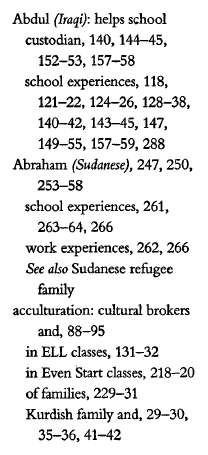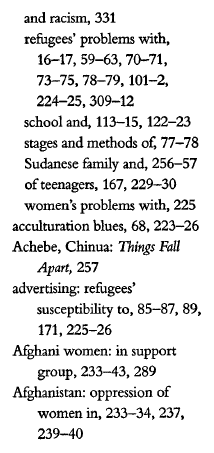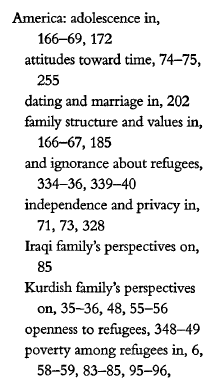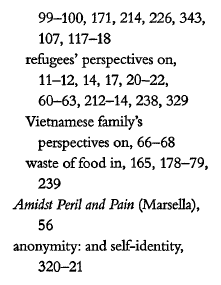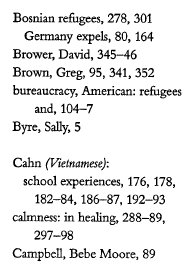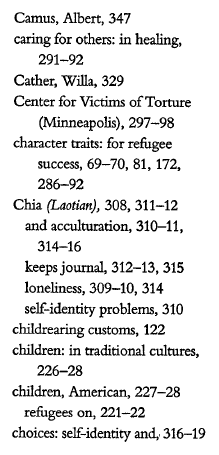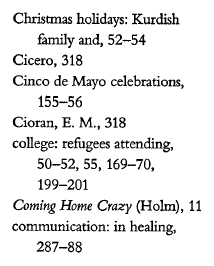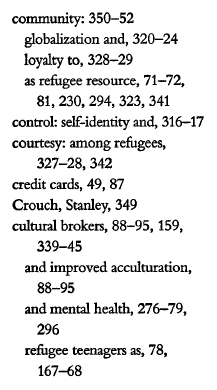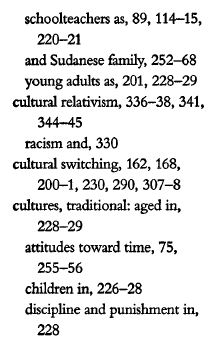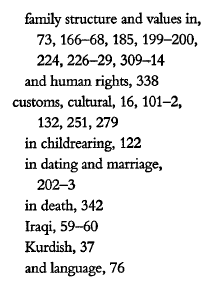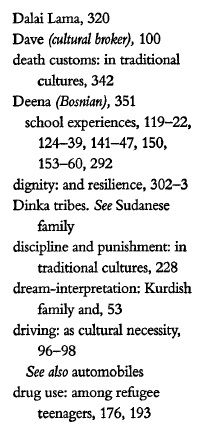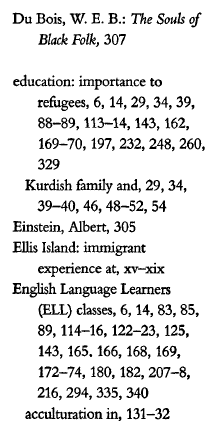The Middle of Everywhere (43 page)
Read The Middle of Everywhere Online
Authors: Mary Pipher

No one shall be subjected to arbitrary interference with his privacy, family, home, or correspondence, nor to attacks upon his honor and reputation. Everyone has the right to the protection of the law against such interference or attacks.
Article 13.
(1)Â Everyone has the right to freedom of movement and residence within the borders of each state.
(2)Â Everyone has the right to leave any country, including his own, and to return to his country.
Article 14.
(1) Everyone has the right to seek and to enjoy in other countries asylum from persecution.
(2) This right may not be invoked in the case of prosecutions genuinely arising from nonpolitical crimes or from acts contrary to the purposes and principles of the United Nations.
Article 15.
(1) Everyone has the right to a nationality.
(2) No one shall be arbitrarily deprived of his nationality nor denied the right to change his nationality.
Article 16.
(1) Men and women of full age, without any limitation due to race, nationality, or religion, have the right to marry and to found a family. They are entitled to equal rights as to marriage, during marriage, and at its dissolution.
(2) Marriage shall be entered into only with the free and full consent of the intending spouses.
(3) The family is the natural and fundamental group unit of society and is entitled to protection by society and the State.
Article 17.
(1) Everyone has the right to own property alone as well as in association with others.
(2) No one shall be arbitrarily deprived of his property.
Article 18.
Everyone has the right to freedom of thought, conscience, and religion; this right includes freedom to change his religion or belief, and freedom, either alone or in community with others and in public or private, to manifest his religion or belief in teaching, practice, worship, and observance.
Article 19.
Everyone has the right to freedom of opinion and expression; this right includes freedom to hold opinions without interference and to seek, receive, and impart information and ideas through any media and regardless of frontiers.
Article 20.
(1) Everyone has the right to freedom of peaceful assembly and association.
(2) No one may be compelled to belong to an association.
Article 21.
(1) Everyone has the right to take part in the government of his country, directly or through freely chosen representatives.
(2) Everyone has the right of equal access to public service in his country.
(3) The will of the people shall be the basis of the authority of government; this will shall be expressed in periodic and genuine elections which shall be by universal and equal suffrage and shall be held by secret vote or by equivalent free voting procedures.
Article 22.
Everyone, as a member of society, has the right to social security and is entitled to realization, through national effort and international cooperation and in accordance with the organization and resources of each State, of the economic, social, and cultural rights indispensable for his dignity and the free development of his personality.
Article 23.
(1) Everyone has the right to work, to free choice of employment, to just and favorable conditions of work, and to protection against unemployment.
(2) Everyone, without any discrimination, has the right to equal pay for equal work.
(3) Everyone who works has the right to just and favorable remuneration ensuring for himself and his family an existence worthy of human dignity, and supplemented, if necessary, by other means of social protection.
(4) Everyone has the right to form and to join trade unions for the protection of his interests.
Article 24.
Everyone has the right to rest and leisure, including reasonable limitation of working hours and periodic holidays with pay.
Article 25.
(1) Everyone has the right to a standard of living adequate for the health and well-being of himself and of his family, including food, clothing, housing, and medical care and necessary social services, and the right to security in the event of unemployment, sickness, disability, widowhood, old age, or other lack of livelihood in circumstances beyond his control.
(2) Motherhood and childhood are entitled to special care and assistance. All children, whether born in or out of wedlock, shall enjoy the same social protection.
Article 26.
(1) Everyone has the right to education. Education shall be free, at least in the elementary and fundamental stages.
Elementary education shall be compulsory. Technical and professional education shall be made generally available and higher education shall be equally accessible to all on the basis on merit.
(2) Education shall be directed to the full development of the human personality and to the strengthening of respect for human rights and fundamental freedoms. It shall promote understanding, tolerance, and friendship among all nations, racial or religious groups, and shall further the activities of the United Nations for the maintenance of peace.
(3) Parents have a prior right to choose the kind of education that shall be given to their children.
Article 27.
(1) Everyone has the right freely to participate in the cultural life of the community, to enjoy the arts, and to share in scientific advancement and its benefits.
(2) Everyone has the right to the protection of the moral and material interests resulting from any scientific, literary, or artistic production of which he is the author.
Article 28.
Everyone is entitled to a social and international order in which the rights and freedoms set forth in this Declaration can be fiilly realized.
Article 29.
(1) Everyone has duties to the community in which alone the free and full development of his personality is possible.
(2) In the exercise of his rights and freedoms, everyone shall be subject only to such limitations as are determined by law solely for the purpose of securing due recognition and respect for the rights and freedoms of others and of meeting the just requirements of morality, public order, and the general welfare in a democratic society.
(3) These rights and freedoms may in no case be exercised contrary to the purposes and principles of the United Nations.
Article 30.
Nothing in this Declaration may be interpreted as implying for any State, group, or person any right to engage in any activity or to perform any act aimed at the destruction of any of the rights and freedoms set forth herein.
Barber, Benjamin.
Jihad vs. McWorld.
New York: Ballantine, 1995.
Cather, Willa.
My Antonia.
Boston: Houghton Mifflin, original in 1918.
Daniels, Roger.
Coming to America.
New York: Harper, 1991.
Danquah, Meri Nana-Ama, ed.,
Becoming American.
New York: Hyperion, 2000.
Eng, Phoebe.
Warrior Lessons.
New York: Pocket Books, 1999.
Fadiman, Anne.
The Spirit Catches You and You Fall Down.
New York: Farrar Straus and Giroux, 1997.
Falicoy, Celia Jaes.
Latino Families in Therapy.
New York: Guilford Press, 1998.
Frankl, Viktor.
Man's Search for Meaning.
New York: Pocket Books, 1963.
Friedman, Thomas.
The Lexus and the Olive Tree.
New York: Farrar Straus Giroux, 1999.
Galeano, Eduardo.
Open Veins of Latin America.
New York: Monthly Review Press, 1978.
Holm, Bill.
Coming Home Crazy.
Milkweed Editions: Minneapolis, 1990.
Holtzman, Jon D.
Nuer Journeys, Nuer Lives.
Needham Heights, Massachusetts: Allyn and Bacon, 2000.
Iyer, Pico.
The Global Soul.
New York: Alfred Knopf, 2000.
Jaranson, James M. and Michael K. Popkin, eds.,
Caring for Victims of Torture.
Washington, D.C.: American Psychiatric Press Inc., 1998.
Kaplan, Robert D.
An Empire Wilderness.
New York: Vintage, 1999.
Lee, Evelyn, ed.,
Working with Asian Americans.
New York: Guilford Press, 1997.
Marsella, Anthony, ed., et al.
Amidst Peril and Pain.
Washington, D.C.: American Psychological Association, 1994.
Memmi, Albert.
Racism.
Minneapolis: University of Minnesota Press, 2000.
Millman, Joel.
The Other Americans.
New York: Penguin Books, 1997.
Ohmae, Kenichi.
The Borderless World.
New York: Harper, 1999.
Portes, Alejandro, and Ruben Rumbaut.
Legacies.
Berkeley: University of California Press, 2001.
Raban, Jonathan.
Hunting Mister Heartbreak.
New York: Vintage Books, 1998.
Roy, Arundhati.
Power Politics.
Cambridge Massachusetts: South End Press, 2001.
Said, Edward W.
Out of Place.
New York: Vintage Books, 1999.
Serraillier, Ian.
Escape from Warsaw.
New York: Point, 1990.
Smith, James P., and Barry Edmonston, eds.,
The New Americans.
Washington, D.C.: National Academy Press, 1997.
Sowell, Thomas.
Ethnic America.
New York: Basic Books, 1981.
âââ.
Migrations and Cultures.
New York: Basic Books, 1996.
Teitelbaum, Michael, and Myron Weiner, eds.,
Threatened Peoples, Threatened Borders.
New York: Norton, 1995.
Weiner, Myron.
The Global Migration Crisis.
New York: HarperCollins, 1995.
Zinn, Howard.
A People's History of the United States.
New York: Harper, 1995.
I want to thank my refugee friendsâthe Kurdish, the Kakuma, and the Sierra Leone families who moved from faraway places into my heart. My deepest gratitude goes to the many refugees who shared their stories, but whose names I cannot acknowledge for a variety of reasons including their safety.
Also, I thank Jim Pipher, Jane Isay, and Susan Lee Cohen, loving supporters of this project from the beginning. I want to thank Pam Barger, my heroic first reader, and my other readersâMarge Saiser, Karen Shoemaker, Dave Myers, Leon Caldwell, Sara Pipher, Jamie Pipher, Rachida Faid-Douglas, Sharon Stanton Russell, and Jan Zegers. I appreciate the help from Dr. Aladjem and Dr. Keller at the Bellevue/NYU Program for Survivors of Torture, from all the staff at the Center for Victims of Torture in Minneapolis, and from Peter Frazier-Koontz, Dean Settles, Maria Diaz, Kit Boesch, Deb Demuth, Benjamin Zinc, Amy Struthers, Suzy Prenger, the New Americans Task Force, Susan Garwood, Uma Gupta, Linda Roos, Sheila Jacobs, Suzan Connell, Dr. Christine Keim, Pat Leach, Hilde Dale, Barbara Colvin, Pat Boharty, Karen Christensen, Constance Kingston, Cindy West, Kay Marks, Sharon Kreimer, Betty Carpenter, Sue Galvin, Judy Beste, Maria and Anton Vu, Hoa Tran, Vanja Die, Clover Sterling, Olga Podany, Zainab Al-Baaj, Melody. Kenney, Christy and Dick Hargesheimer, Marty Seligman, Pauline Redmond, Beatty Brasch and the Lincoln Action Program, Dick Roy and the Northwest Earth Institute, the Center for a New American Dream, Tammy Weihe, Mike Schell, Pat Fraikes, Mary Christensen, Susan Kash-Brown, Julie Skonard, Chris Orr, Rita Chen, Dave Masilko from Work USA, Norm Leach, Laureen Van Norman, the Samaritan Center, Rose Esseks, Margo Foreman, and Pam Laws, and thanks to Jennifer Aziz, Susan Amster, Jennifer Holiday, Arlene Kriv, David Nelson, David Hough, Dan Farley, and all the other wonderful people at Harcourt, Inc. Special thanks to the Bellagio Study and Conference Center and the Rockefeller Foundation for giving me a wonderful place to work. Thanks to Gianna Celli, Alberta and Ed Arthurs, and Susan Garfield for making Bellagio a paradise for its scholars.
The stories in this book are all about real people in my town. Some people wanted their names used and others did not. I have respected their requests. With the students, with clients, and with others who were concerned about their privacy, I have changed identifying details. I also changed the name of the schools, again to preserve the privacy of the students.
For the most part when I have quoted refugees I have corrected their English. I was just not up to the job of transcribing the thirty-two varieties of broken English in our city. Occasionally I have kept a phrase or two, because it seemed important for capturing the flavor of an interaction.
